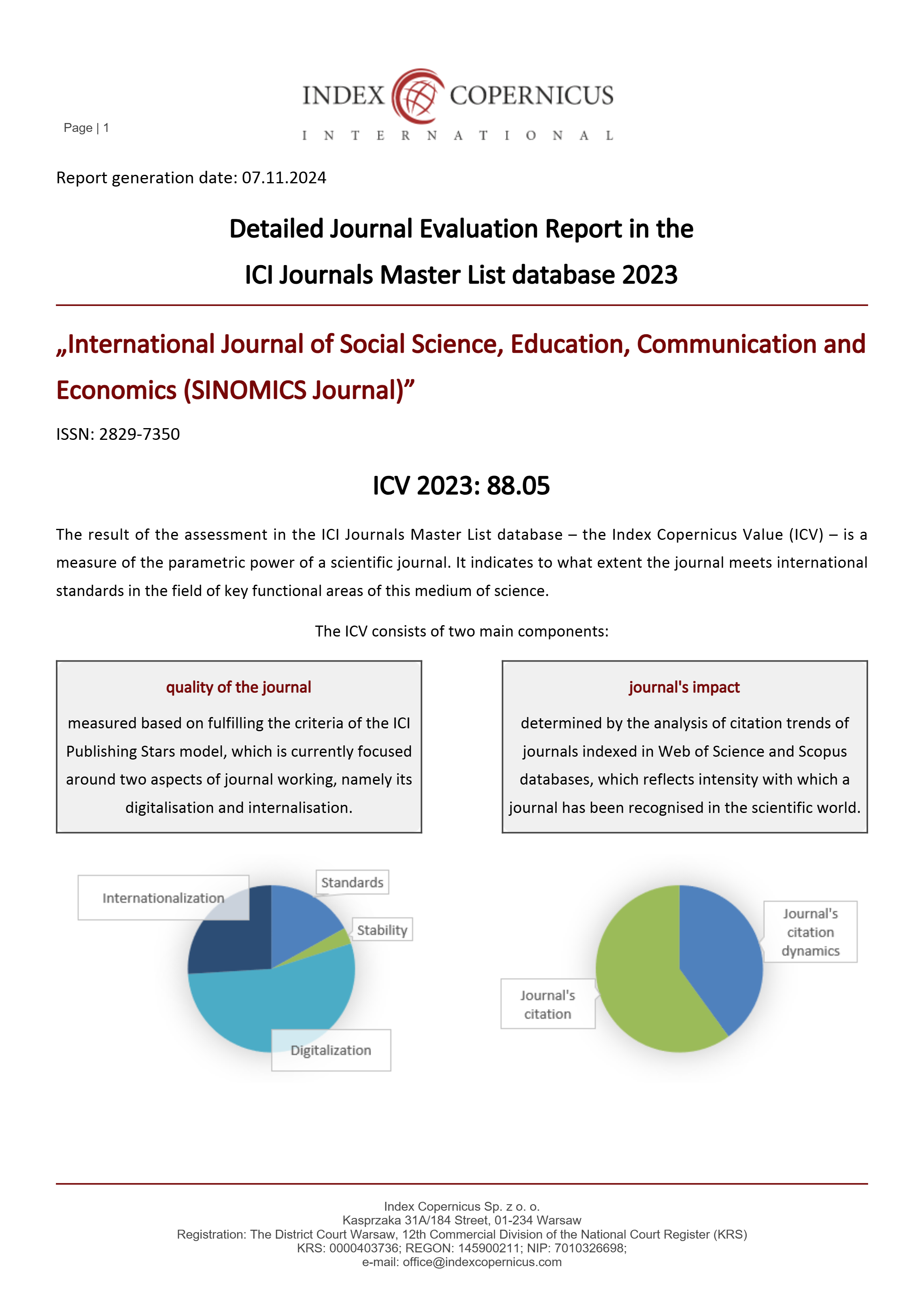Optimization of Household Waste Management in Manado City
Main Article Content
Chandra Christianson Kapojos
Recky H. E. Sendouw, MM, Ph.D.
Dr. Abdul Rahman Dilapanga, M.Si
Garbage in Indonesia is a serious problem that has social, economic and cultural impacts. Waste management in almost all cities in Indonesia is experiencing problems, mainly due to the lack of Final Processing Sites (TPA). As a result, people often throw garbage in rivers, ditches, rivers and the sea. With a population that is in the top 10 in the world, Indonesia's waste production reached 65 million tons in 2016. Garbage causes various problems in society, including natural disasters such as floods. The lack of public awareness in disposing of waste in the appropriate place, as well as the lack of selection and recycling of waste, has an impact on natural disasters and damaged environment. The government needs to learn from the experience of the disaster and take preventive steps. The responsibility for waste management lies not only with the community, but also with the local government. The government needs to regulate and inform the public about proper waste management, as well as provide facilities that assist in waste management. The scale of waste management is carried out through the collection, transfer, processing and transportation of waste to the TPA. With population growth and regional development, the amount of waste generated is increasing. To maintain environmental sustainability, it is necessary to limit and reduce waste generation. Waste can also be turned into a resource through recycling and reuse. Therefore, the government makes national policies and strategies as well as guidelines for local governments in managing household waste and the like. Manado City refers to Regional Regulation Number 1 of 2021 in waste management. However, the volume of waste in Manado City continues to increase along with the rapid population growth. Limited garbage collection vehicles have caused some waste to go unmanaged and accumulate in rivers, drainages and other places. Lack of trash bins, delays in transporting waste from TPS to TPA, and poor TPA management are also problems. Research shows that there are several violations in waste management in Manado, such as a lack of public awareness in disposing of waste, the minimum number of garbage collection fleets, and delays in waste transportation. Garbage is still scattered in various corners of the city, including the coast and rivers. TPA management is also not optimal, causing public health and hygiene to be disrupted. Public awareness to dispose of garbage at the specified time is still lacking. In order to overcome this problem, it is necessary to increase public awareness, improve waste collection facilities and fleets, and improve the effective management of landfills. With these steps, it is hoped that waste management in Indonesia, especially in Manado City, can reduce its negative impact and become more sustainable.
Afifah F. 2020. Sayangi bumi dengan membuat pupuk kompos dari sampah rumah tangga. https://id.theasianparent. com/cara-membuat-pupuk-kompos 24 Agustus 2020 Jam 13.21
Agustino, L. (2008). Dasar-Dasar Kebijakan Publik.
Arikunto. 2018. Prosedur Penelitian Suatu Pendekatan Praktik. Jakarta: Rieneke Cipta.
Amanda Prihatini Tatawi, I. ., Pangkey, I. ., Sendouw, R. ., & Dame, J. . (2022). The Influence of Administrative Skills and Information Systems on Public Services at The Faculty of Economics and Business, Manado State University. International Journal of Social Science, Education, Communication and Economics (SINOMICS JOURNAL), 1(5), 641–652. https://doi.org/10.54443/sj.v1i5.71
Anderson, J. E. (2011). Public Policymaking, 7th edition. In Media.
Budi Winarmo. (2007). Kebijakan Publik: Teori dan Proses. Media Pressindo.
Bungin, B. 2008. Analisis Data Penelitian Kualitatif. Jakarta: Raja Grafindo Persada.
Dunn, W. N. (2003). Pengantar Analisis Kebijakan Publik II. Gadjah Mada University Press.
Dye, T. (1976). Predicting City Government Structure. 20, 15. https://doi.org/https://doi.org/10.2307/2110644
Easton, D. (1957). An Approach to the Analysis of Political Systems. World Politics. https://doi.org/10.2307/2008920
Handaratri A, Yuniati Y. 2015. Pelestarian Lingkungan Melalui Tatajer. Abdimas 19(2): 71-76.
Irawan, Setyorini D., dan Rochayati S. 2012. Proyeksi Kebutuhan Pupuk Sektor Pertanian Melalui Pendekatan Sistem Dinamis. Prosiding Seminar Nasional Teknologi Pemupukan Dan Pemulihan Lahan Terdegradasi. Bogor. Hal. 123-139
Kastaman, R. dan Kramadibrata, A, M. 2007. Sistem Pengelolaan Sampah Terpadu. Jakarta: Humaniora.
Kencana, S. (2006). Ilmu Administrasi Publik. Rineka Cipta.
L.Moleong. (2010). Metode peneltian. Jakarta: Rineka Cipta.
Laswell, H. D., & Abraham, K. (1970). Power and Society,. Yale. University Press.
Lexy J. Moleong, D. M. A. (2019). Moleong, Lexi J, 2014. ” Metodologi Penelitian Kualitatif Edisi Revisi”. Bandung : Remaja Rosdakarya. PT. Remaja Rosda Karya.
Lincoln dan Guba. (1985). Naturalistic Inquicy. sage.
Mardiasmo. 2009. Akuntansi Sektor Publik. Yogyakarta: ANDI.
Mantiri, J. (2018). The Impact of Public Participation Towards Waste Management In Tataaran Patar Village of South Tondano District. Jurnal Ilmiah Administrasi Publik. https://doi.org/10.21776/ub.jiap.2019.004.01.8
Mantiri, J. and D. (2019). Evaluasi Pengelolaan Sistem Informasi Administrasi pada Dinas Kependudukan dan Pencatatan Sipil Kota Tomohon. Jurnal Kajian Kebijakan dan Ilmu Administrasi Negara (JURNAL ADMINISTRO).
Nasution. (2003). Metode penelitian Naturalistik kualitatif. Tarsito.
Nugroho D. Riant. (2004). Kebijakan Publik, Formulasi, Implementasi, dan Evaluasi. Gramedia.
Peraturan Daerah Nomor 1 Tahun 2021 tentang Pengelolaan Sampah. (n.d.).
Peraturan Presiden Republik Indonesia Nomor 97 Tahun 2017 tentang “Kebijakan dan StrategyNasional Pengelolaan Sampah Rumah Tangga dan Sampah Sejenis Sampah Rumah Tangga.” (n.d.).
Sirajuddin D, Iksan M. 2017. Pengembangan Home Industri Dampo’ Pisang Aneka Rasa Melalui Kkn-Ppm Di Desa Bassiang Kecamatan Ponrang Selatan Kabupaten Luwu. Berkemajuan: Jurnal Pengabdian Kepada Masyarakat, Vol. 1, No. 1, hal. 22-25.
Slamet, J, S. 2012. Kesehatan Lingkungan. Yogyakarta: Gajah Mada University Press.
Sugiyono. (2016). Metodologi Penelitian Kuantitatif, Kualitatif, dan R&D. In CV Alfabeta. https://doi.org/https://doi.org/10.3929/ethz-b-000238666
Sugiyono. (2017). Metode Penelitian Kuantitatif, Kualitatif, dan R&D. CV. Alfabeta.
Suharno. (2010). Dasar-dasar kebijakan publik. UUY Pres.
Sumantri, A, H. 2010. Kesehatan Lingkungan. Revisi. Jakarta: Kencana Prenada Media Grup
Sunarti, E. (2012). Tekanan Ekonomi dn Kesejahteraan Objektif Masyarakat di Pedesaan dan Perkotaan. Prosiding Seminar Hasil-Hasil Penelitian IPB Bogor LPPM.
Syafri, W., & Alwi. (2014). Manajemen Sumber Daya Manusia Dalam organisasi Publik. Bandung IPDN Press.
Undang-Undang Nomor 23 Tahun 2014 tentang Pemerintah Daerah
Undang-Undang Republik Indonesia Nomor 18 Tahun 2008 Tentang Perlindungan dan Pengelolaan Sampah.










